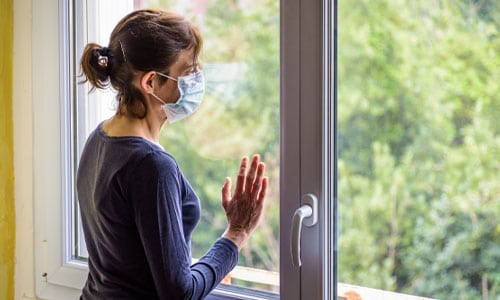
By now, there isn’t anyone that hasn’t been affected by COVID-19. It’s a global event that has drastically altered the way we go about our daily lives. It goes without saying that some are far more affected by the current crisis than others. The virus has had a huge bearing on the mental health of many otherwise stable individuals. But it has only added to the struggles of those already living with pre-existing mental health conditions.
Perhaps one of the most overlooked of these are people who suffer from Borderline Personality Disorder (BPD). The psychosocial factor of the coronavirus has created a situation in which the symptoms of this condition can reach a heightened and even unmanageable state. The emotional dysregulation commonly experienced by BPD sufferers is sent into overdrive, as the fear of infection alone increases anxiety and insecurity.
How Coronavirus Has Affected Those with Borderline Personality Disorder
One of the core issues in those with Borderline Personality Disorder is the persistence of mood swings and an inability to manage changes in circumstance. This tends to manifest most within inter-personal relationships. When the emotional needs of an individual aren’t being met, it leads to feelings of abandonment. Given the social distancing guidelines that are in place, this has made it especially hard for those with BPD. In those who are already prone to perceiving social rejection, their fears have become something of a reality, which only serves to reinforce the sense of loneliness and chronic feeling of emptiness.
The constant need for reassurance from friends and family is nowhere near as available as it was just a few months ago. And what’s more, it arrived as a hard cut-off point. There was relatively little time for an adjustment period. It was instant. In those who’re already hyper-sensitive to social situations and the dynamics surrounding them, it has brought with it an increased need to gain support through whatever channels are still open. Although the fear of abandonment may be an imagined scenario, the emptiness that accompanies it is a very real emotional burden that must be relieved.
The great challenge of managing BPD through the pandemic is that reality appears to be confirming the underlying suspicions at play. This can lead to an escalation in the feeling of abandonment, along with accompanying bouts of anger and stress. The need to gain constant validation can see the individual trying to manufacture conversations to maintain some form of social contact. But this behaviour is rooted in over-compensating, which can only be appeased for so long, even by the most understanding of people. And when the calls and messages go unanswered, it results in a dissociation from reality.
The inability to empathise with other’s position is a big stumbling point in trying to rationalise why you may not be getting the responses you expect as a BPD sufferer. People have limits. They only have so much energy to expend, and some things just aren’t deemed worthy of a reply. It’s normal. This lack of awareness is one of the biggest obstacles that need to be overcome to bring back a sense of stability. If left unchecked, it can result in splitting episodes. This is the classic see-saw mindset that sees individuals experience the love/hate polarity – that, in turn, leads to dissociation or a complete body shutdown. However, even if you are aware of your tendencies to over-extend, it can still result in these splitting episodes due to the overriding guilt and the effort to consciously pull yourself back to centre.
Coping Skills to Help You Manage the Coronavirus
Despite the obvious attachment issues at play within those who have BPD, having people to talk to is important. A reliable support network is necessary to help you manage your symptoms. It’s unrealistic to be expected to manage such unstable emotions that require confirmation and validation. The key factor in having a support network is in having them understand that they are a part of your support network. Possibly the most self-sabotaging thing you can do as a BPD sufferer is reaching out to everyone in your contacts list and expecting the same level of compassion from every person each and every time. Create a core group of people that you know you can rely on and set clear rules and boundaries. If they’re unable to provide you with support, then don’t include them in your network. Failure to respond when you’re in genuine need of reassurance will only heighten your sense of abandonment. And if you’re unable to form a group of your own, there are many support hotlines and online forums where you can seek validation.
Besides relying on other people to make you ‘feel better,’ the best thing you can do for yourself is learning how to become self-sufficient and manage your own emotions. The most basic of these is finding an activity that will occupy your mind when you’re experiencing a heightened emotional state. This is called behavioural activation. It could be absolutely anything you wish, as long as it allows you dissociate from your thoughts. Repetitive tasks that require your concentration generally work best, or any form of creative activity, such as drawing, writing or playing a musical instrument. The effect that these exercises have on you is one of grounding, which is particularly beneficial if you’re going through a splitting episode. But if for whatever reason, you can find a suitable activity, guided meditations found on many free to download mobile apps can be an enormous help. You don’t need to be an experienced meditator – all you have to do is relax and listen to the instructions. Many of them also employ binaural beats allowing you to reach a deep state relaxation extremely quickly.
If you’re struggling with Borderline Personality Disorder during the current pandemic, there are options for you to explore. There are many more resources online that will pull up more suggestions for how to navigate your emotional instability and bring yourself back to a place of groundedness.












